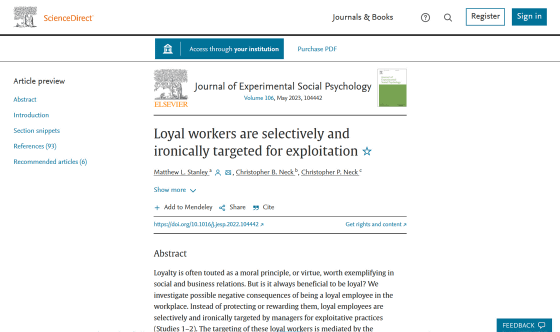Research results that 'faithful workers are more likely to work for free by managers'

'Loyal workers' are very beneficial for companies and organizations, and workers can increase the possibility of preferential treatment in terms of promotion and salary by showing loyalty to the organization. However, a study conducted by an American research team showed that ``faithful workers are more likely to be made to work for free by managers and are more likely to be exploited''.
Loyal workers are selectively and ironically targeted for exploitation - ScienceDirect

Managers Exploit Loyal Workers Over Less Committed Colleagues | Duke Today
https://today.duke.edu/2023/03/managers-exploit-loyal-workers-over-less-committed-colleagues
Loyal Workers Are More Likely to Be Exploited, And This Is Why : ScienceAlert
https://www.sciencealert.com/loyal-workers-are-more-likely-to-be-exploited-and-this-is-why
A research team led by Matthew Stanley, a postdoctoral fellow at Duke University in the United States, surveyed nearly 1,400 managers online to see if they target loyal employees for exploitative practices. We recruited. The research team then created a letter of recommendation for a fictitious 29-year-old employee named 'John' and asked the gathered managers to read it. John's recommendation letter made by the research team was not one, but there were several variations in John's reputation, personality, and other backgrounds.
Managers who participated in the experiment read John's letter of recommendation and asked, ``As a manager of a company with a limited budget, do you want to assign additional tasks that require more time and responsibility to John without compensation? ” was asked.

As a result of the experiment, no matter how Mr. Stanley and others constructed John's scenario, if 'John is a loyal employee' was branded in the letter of recommendation, managers would They tended to choose to do unpaid work. In addition, it seems that management staff were paid a reward of $ 12 (about 1600 yen) as a reward for participating in the experiment.
Managers were more likely to use 'loyal John' than 'unfaithful John'. In addition, it was confirmed that letters of recommendation praising 'faithfulness' were more motivated to assign unpaid work to John than letters of recommendation that appealed to merits such as 'honesty and fairness'.
Also, if the recommendation stated that 'John was willing to take on additional work or responsibility', there was a higher chance of being in a managerial position compared to if it stated 'John declined additional work'. were more likely to rate John as a 'loyal employee'.
'It's a vicious circle,' Stanley said. 'Loyal workers tend to be picked for exploitation by managers. It makes them more likely to be selected for future exploitation.'

When assigning additional tasks, managers often think that it is not exploitative if they 'ask' rather than 'request' employees. However, managers are in a position to control access to important resources such as employee salaries and health insurance, and the difference in power between managers and employees makes it difficult for employees to refuse unpaid work. in a position.
According to the research team, one of the reasons managers extract more from loyal employees is that managers believe that loyalty requires personal sacrifice for the company. I think it was because I had it. However, many managers do not consider their actions to be exploitation, but recognize that they are normal practices, and in this case managers are ``ethical blind'', the research team said. points out.
“Most people want to be good people,” says Stanley. They don't see that what they are doing is inconsistent with the principles and values they profess.' Therefore, as a way to stop exploitation from loyal employees, it may be effective to point out ethical blindness to managers and make them aware of their own mistakes.
Although the results of this study showed that loyal employees are vulnerable to exploitation, loyalty is one of the positive personality traits, and the research team found that people abandoned their commitment to work and I am not recommending that you give up your loyalty to ``The lesson to be learned from this paper is not to swear allegiance to anyone,'' Stanley said. It's a very complex and tricky thing, not just a negative one,' he said.

Related Posts:
in Science, Posted by log1h_ik







